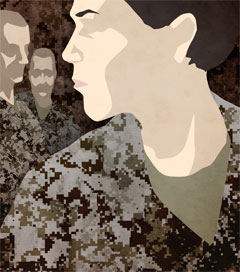The first decade of the 21st century was a record one for women serving in the US military: Women constituted 14 percent of all active duty military (over 200,000), with one in ten serving in the Middle East and 17 percent in the National Guard. Women soldiers in the Iraq and Afghanistan wars, though barred from ground combat, have worked in as dangerous situations as men. These same women have found themselves, concurrently, the target of sexual assault by “brothers in arms” at nearly twice the rate of US society. Military sexual trauma is so severe that it is more likely to cause post-traumatic stress disorder in women than combat trauma and civilian sexual trauma – because of military culture.
In this series, “The Battlefield and the Barracks: Two War Fronts for Women Soldiers,” we will probe the magnitude of sexual assault and harassment of women in the military. What is it about military culture that results in such extreme sexual crime? Why is sexual assault so traumatizing for women soldiers? What are the responses of the Department of Defense and the Veterans Administration to the epidemic of sexual crime in their midst, with its multiple health consequences? And what are the radical changes necessary to reform a recalcitrant military?
H. Patricia Hynes, Author of the Series: “The Battlefield and the Barracks: Two War Fronts for Women Soldiers”
Read the Articles Below:
H. Patricia Hynes is a retired professor of environmental health from Boston University School of Public Health, who directed community-based environmental justice projects in Boston Public Housing and diverse, low-income neighborhoods in Boston. For her work, she has received many awards, including Life Time Achievement Awards from the Boston Natural Areas Fund and EPA New England, as well as Boston University teaching awards and an American Public Health Association Best Practice Award. Her book, “A Patch of Eden: America's Inner-City Gardeners.” received the 1996 Book of the Year Award from the Arbor Day Foundation. An environmental engineer, Pat designed her passive solar home, worked for EPA in the Superfund Program and subsequently wrote “The Recurring Silent Spring” on the impact of Rachel Carson's groundbreaking critique of pesticides in agriculture. A longtime feminist, she co-founded Bread and Roses in 1974, a feminist restaurant and cultural center in Cambridge, Massachusetts. Currently, she works and writes on peace and justice issues in western Massachusetts where she chairs the board of the Traprock Center for Peace and Justice.
Join us in defending the truth before it’s too late
The future of independent journalism is uncertain, and the consequences of losing it are too grave to ignore. To ensure Truthout remains safe, strong, and free, we need to raise $31,000 in the next 48 hours. Every dollar raised goes directly toward the costs of producing news you can trust.
Please give what you can — because by supporting us with a tax-deductible donation, you’re not just preserving a source of news, you’re helping to safeguard what’s left of our democracy.
